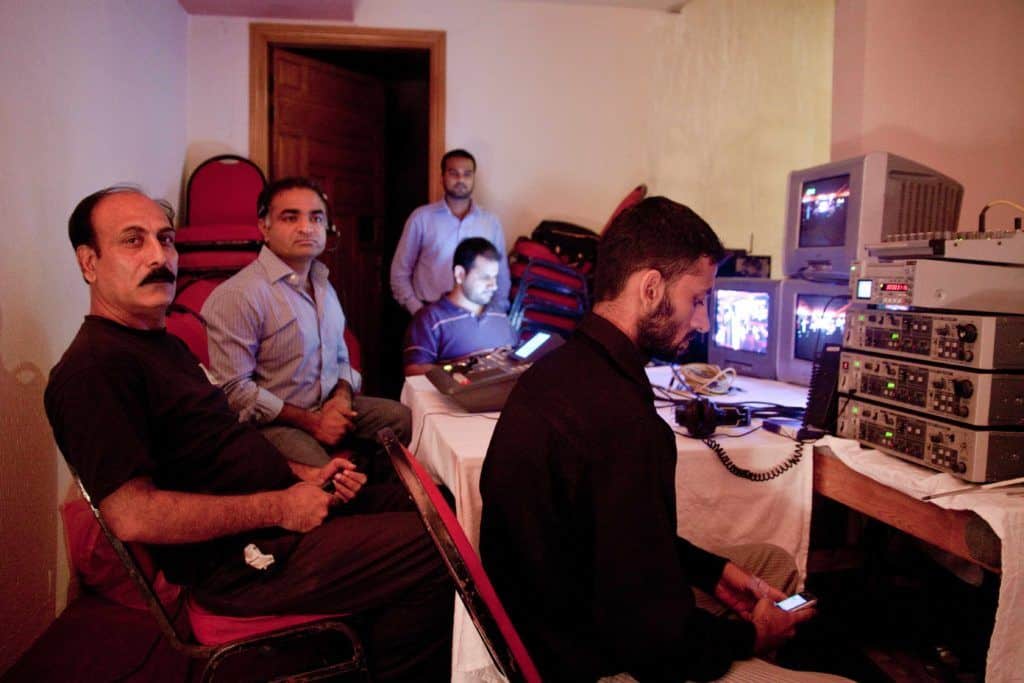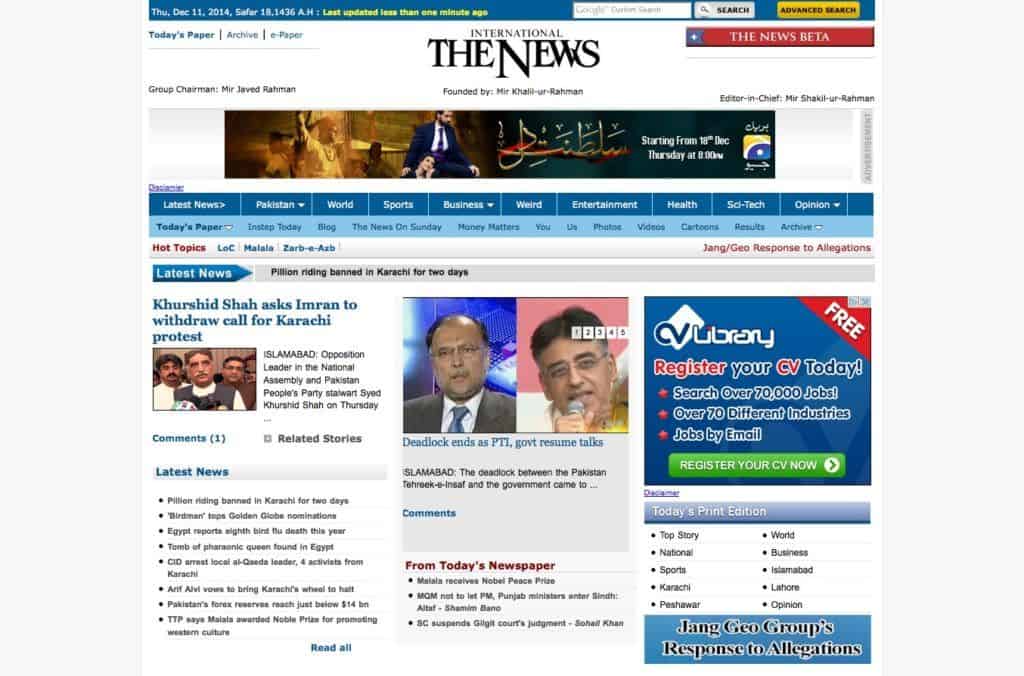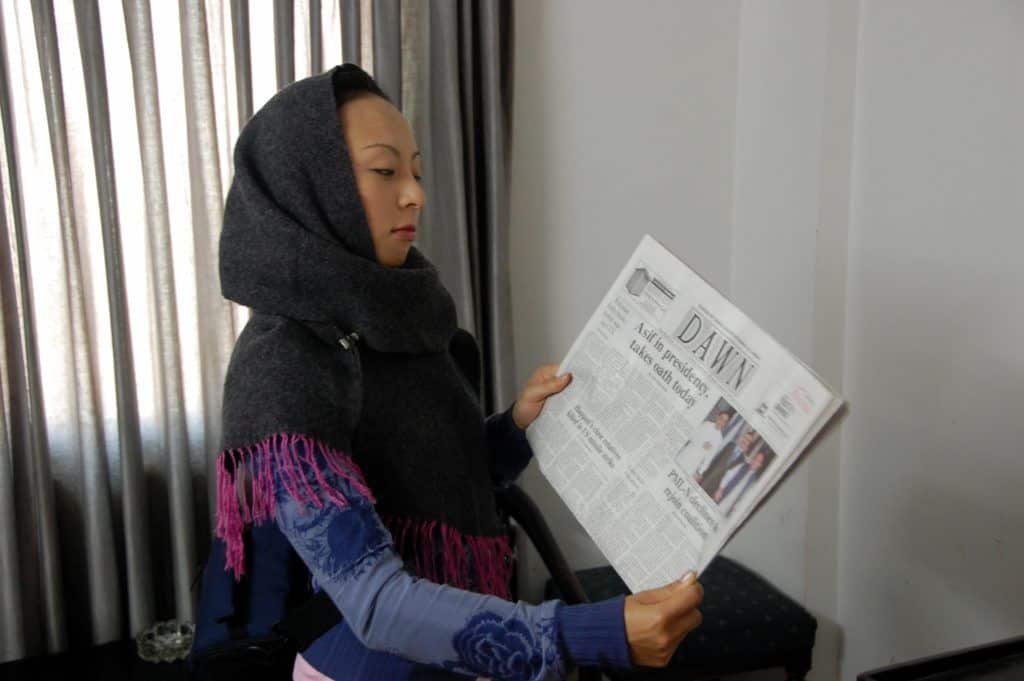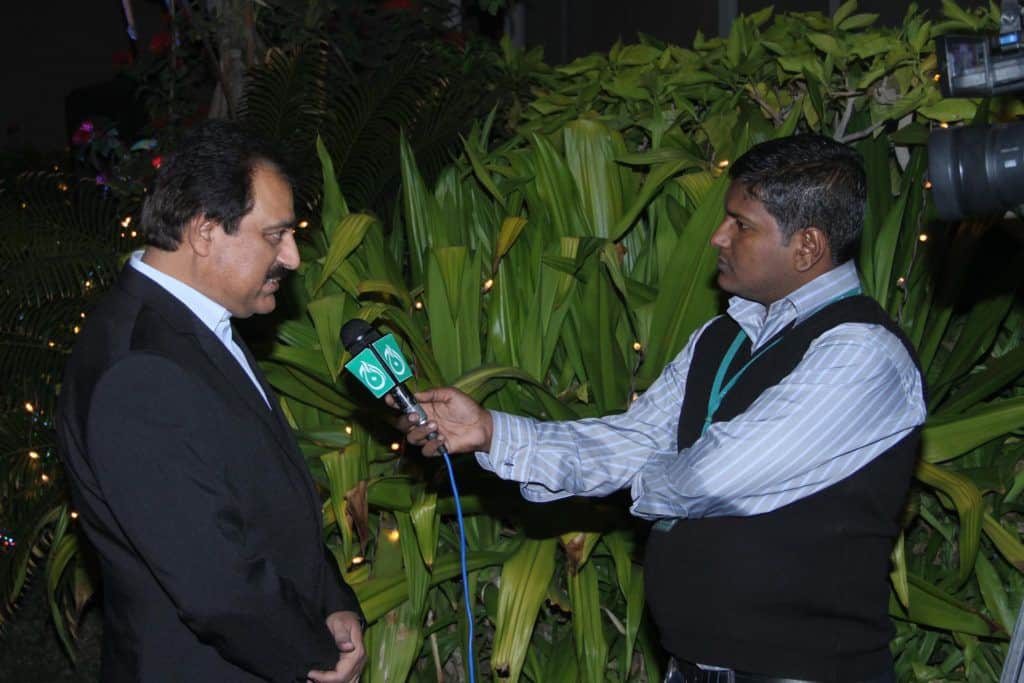By Zaffar Abbas
Despite all its problems, despite the many controversies, the Pakistani media had grown to be a national institution that many could be proud of. But what dictators, anti-democrats and right-wing extremists could not achieve in decades, the media seems to have done to itself in a few short weeks. It is time for the few good men and women left in this profession to stand up and be counted.”
– Excerpt from editorial published in Dawn newspaper on May 19, 2014
In April 2014 a tragic incident shook the media in Pakistan. A prominent journalist, also a leading television talk-show host, was shot as he was driving out of the airport in Karachi. Hamid Mir was hit seven times and was extremely luckily to survive. Although Pakistan has for a long time been considered one of the most dangerous countries for journalists, mainly because of the manner in which dozens of media persons have been gunned down by various warring groups, the attack on Mr. Mir led to a very different kind of controversy. Many media experts believe that what ensued in the aftermath of this incident resulted in the virtual death of self-regulation, or for that matter all ethics in the Pakistani media.
The media company, the Jang-Geo group, that Mr. Mir works for, unleashed a vicious campaign against the country’s premier intelligence agency with unsubstantiated allegations against it for the attack.
This was soon followed by an equally vicious campaign in a number of newspapers and on several television channels against the Geo-Jang group, accusing it of undermining the armed forces and its intelligence agency, the ISI. Some media groups editorially took the position that the Geo-Jang group’s tirade against the security institution was at the behest of the government, which had developed serious differences with the military leadership on a number of policy issues. At the same time, many critics of these media houses accused them of campaigning against Geo-Jang on behalf of the military establishment. The allegations from both the sides had some merit but, as subsequent events proved, one of the reasons was also the commercial interests of these warring media houses.
During this internecine media conflict readers and viewers observed some gross violations of the internationally-recognised codes of media ethics. As animosities developed they witnessed the Pakistani media, or a large section of it, at war with itself.
Fast forward to August 2014 and we see a large section of the media playing a highly partisan role during a serious political crisis in Islamabad involving two opposition groups that want to bring down an elected government through street agitation, and were stopped through the use of brute police force. During the non-stop coverage of the crisis, news stories were published and broadcast with clear slant, and several talk-show hosts and news presenters became players in shaping public opinion in support of or against the government. Even some of those media houses that have their own codified system of self-regulation decided to put those rules aside while taking a plunge into this conflict.
So, what went wrong? Did we reach the current pass because of the absence of effective systems of self-regulation, or because some of the media owners and editors, for reasons of monetary gains, decided to ignore the regulatory or monitoring systems they themselves had created? An even bigger question: were these slippages unintentional, or are they indicative of a bigger malaise which has its roots in the manner in which the media industry has taken shape in the country in the last couple of decades?
In order to understand this development, it’s important to look at the evolution of the media industry in Pakistan. This includes the media’s transition from a period of direct and indirect censorship to a fairly free press, the emergence of privately-owned television channels and then a period when political and commercial interests started to play an active role in shaping news content.
The first four decades since the country’s inception in 1947 was the period when, most of the time, media worked under highly-regulated government controls. During these years newspapers did grow in number but there were fewer quality publications in the country. However, they too worked under repressive media laws and were often subjected to closure or censorship. The radio waves remained under complete state control, and when television came to the country in the 1960s, it was directly run and managed by successive governments. During this time journalism was viewed more in terms of the quality of writing than as a free and independent medium for disseminating information.
This period saw the emergence of a very strong and professional journalists’ body, the Pakistan Federal Union of Journalists (PFUJ). And though at a very early stage of its creation it did adopt a proper ‘code of conduct’ for working journalists, due to the prevailing situation most of its energies were spent on working for journalists’ labour rights and on the campaign for press freedom. The situation within newspapers was also not too different. Though many professional editors and journalists were aware of the need for self-regulation, very little attention was paid to this crucial aspect of journalism. Unfortunately, during this time, many journalist activists thought an increased emphasis on self-regulation would be another form of self-censorship.
The mid-1980s mark a watershed in the struggle for press freedoms. Not only did the unions win court cases against repressive press laws, the peoples struggle for the restoration of democracy compelled successive governments to open up the media, and allow almost complete freedom. The newly earned freedom led to remarkable growth in the press industry and compelled journalists to adopt new investigative journalism tools to expose corruption and poor governance.

“TEDxKarachi” by Nadir Siddiqui (https:// ic.kr/p/8bJFGN) is licensed under CC BY 2.0
With the turn of the century, the government also agreed to loosen its control over the electronic media, and within a decade nearly two dozen television channels emerged on the scene, broadcasting round-the-clock news. This rapid mushrooming of 24/7 news channels was a completely new phenomenon. At one level it marked remarkable growth in the media industry, and even resulted in the improvement of wages for journalists. But at a different level, it also threw up unexpected challenges. With the commercial and industrial activity not picking up at the same pace, the battle for survival for television companies resulted in an ugly competition for viewership ratings, and for getting the bigger share from the relatively small advertisement pie.
The result was not very unexpected. Sensationalism started to replace serious journalism, concepts of ethics and self-regulation were set aside, and in many cases political and commercial interests started to play a dominant role in the selection of news and the airing of views. Though this trend was more evident in television, a number of newspapers also failed to remain immune.
It would be wrong to say that the concept of ethics and media regulation have never existed in the country. These issues have been talked about from the very early years, have been codified in some cases, and in some areas are still being implemented successfully. For instance, the main journalists’ union, the PFUJ, has from its very inception incorporated in its constitution a fleshed-out code of conduct. At a later stage, the editors’ body, the Council of Newspaper Editors (CPNE) also came up with its own code which was acceptable to the publishers’ body, the All Pakistan Newspapers Association (APNS). With the advent of privately-owned television companies, a body representing the owners was formed. But to date, the Pakistan Broadcasters’ Association (PBA) has not been able to agree on its own code of ethics.
At the national level, the Pakistan Electronic Media Regulatory Authority (PEMRA) is responsible for regulating television and radio outlets, and has its own code of conduct. But the recent inter-media war has exposed its ineffectiveness, and efforts are now being made to develop a new and more effective code for the electronic media. The government-appointed Press Council of Pakistan (PCP) is still in its infancy, and though it has a codified system of receiving and addressing complaints, it remains largely ineffective.
Although many newspapers and television companies say they follow their own systems of self-regulation, only two newspapers, Dawn and Express Tribune, and one television channel, Geo, have publicly declared their respective codes of conduct. In the case of the Express Tribune and Dawn, there also exists the institution of an internal ombudsman or readers’ editor, though these systems too require improvement.
There are several factors behind this failure or ineffectiveness of the systems for making the media more responsible to its audiences. The haphazard growth of the industry, the lack of investment in journalists’ professional training, the absence of the institution of professional editors in most media houses and the direct commercial or political interests of owners can contribute to the current state of affairs.
Many media monitoring groups and experts believe that self-regulation at the enterprise level to resolve public complaints in Pakistan is largely a slogan adopted by media houses to satisfy sections of civic society that make demands through blogs or some of the noisier civic forums. It is seldom, if ever, accompanied by the setting up of a credible system of dealing with complaints, nor is it viewed as a powerful means of engaging with audiences. Short-sighted self-interest and empty protestations of self-regulation by media houses is simply a smokescreen to deceive governments that demand an effective resolution to complaints made by their own departments, in the interests of curtailing criticism about corruption and incompetence in governance.
In other words, in the Pakistan of today, the self-regulation of media houses at the enterprise level is an amorphous series of behavioral practices. A major reason for this is the distinctive characteristics of media houses vis-a-vis the mix of media. Such self-regulation depends on the mix of print media in the media house (that is periodicity, the political complexion of newspapers, etc.), the linguistic differentiation of various newspapers and periodicals and the existence of responsible editors.
Legal advisors for a media group or individual medium are usually a crucial factor in the response that emerges. The response of the print media in such a media house tends to be a little more meaningful, if the newspaper is in English rather than in the vernacular language Urdu, and even less so if a newspaper is printed in regional languages – which due to financial resources or distance from the core of the modern print media publishing find themselves less able, or are perhaps less inclined, to pursue complaints.
Hameed Haroon, the CEO of Pakistan Herald Publications Limited, which publishes Dawn newspaper, and the current president of APNS, puts the issue into context. He believes the near absence of a formal and efficient industry-wide mechanism for the print media (PCP being only a skeletal organisation in its infancy); the low priority accorded to a non-powerful complainant versus national politicians or major advertisers, who are in a position to swiftly retaliate in case a medium does not choose to vent their complaints in print adequately and tend to be given priority over private individuals whose complaints tend to be put on hold; and the arrogance of the television managements and editors in ignoring complaints – which appears to be the norm – all contribute towards low quality of self-regulation at enterprise level.
According to him, the effective parameters that govern self-regulation include the conscience of editors and journalists on the one hand and the desire of media houses not to be involved in costly and long drawn-out litigation on the other. “Whereas these are important factors in many countries, they emerge as the only effective parameters or checks on media behavior,” he believes. “Self-regulation has been reduced to a somewhat meaningless and ill-functioning mechanism in Pakistan.” However, he hastens to add that individual newspapers, such as Dawn, with a powerful, functioning and autonomous journalistic group of decision-makers, tend to be more meticulous and non-discriminatory in addressing corporate and even individual complaints.
Javed Jabbar, a former minister of information and broadcasting and a known campaigner for the development of ethical values in media, believes that although media houses do engage with the audience, “this engagement is mainly media-centered, when the audience gets to be seen or heard in the media.” According to him, randomly chosen or carefully selected citizens invited to a television studio entertainment or discussion programme, or citizens participating in a program recorded on the streets outside the studios, are given the transient pleasure of being featured in the media, in a reflection of how the media “engage” with their audiences. “But with only a few exceptions, in general, this opportunity provided to audiences is too brief and, in any case, the duration of discussion is entirely controlled by the media, not by the audience,” he says.
Though aware of its limitations in the Pakistani context, Professor Tausif Ahmed Khan, chairman of the Department of Mass Communications at the Urdu University, nevertheless believes that the only way to enhance professionalism in the media is by encouraging the concept of self-regulation. “It strengthens objectivity and promotes the role of the media as a fair and unbiased provider of information,” he points out.
This view is endorsed by Rameeza Nizami, owner and managing editor of the Nawa-e-Waqt group that also publishes the English-language newspaper, The Nation. “There’s not one government or non-government body that all media houses agree is able/worthy of monitoring the media,” she says. Although her media group doesn’t have a codified system of regulations.
Ms Nizami says readers’ complaints are taken quite seriously if they pertain to a story being considered unfair or slanderous. However, she says those are not the only kind of complaints. “There are regular instances, for example, of readers complaining about an advert featuring the bare legs of an actress, in a hair removal cream ad, suggesting it is a failure of the organisation to have allowed such an ad to be printed,” she explains. Again, she says, self-regulation works best here. “Were such complaints the domain of some press council, perhaps with a member of the government-run Council of Islamic Ideology on the panel, it would be much more difficult to handle them with grace”.
Her views are echoed by Talat Aslam, senior editor at The News (the English-language newspaper of the Jang-Geo group). “To be honest, the voluntary national systems are largely toothless and cosmetic in nature,” he says. “I have rarely seen them intervene, even in cases of serious abuse”. As for self-regulation, he says in the case of The News there is a more conventional mechanism where specific complaints are accommodated in either the ‘Letters to the Editor’ section or as clarifications in which the points of view of aggrieved parties find space. In the latter case, he says, the reporter is also given the right of reply to any accusations of distorting facts. However, he admits that at times the reporters tend to misuse this system and in their rebuttal repeat the same allegations.
Both these newspaper do not have the institution of an internal ombudsman or readers’ editor. In fact, Ms Nizami sees no point in having such a system and insists on proper editorial filters that work. “There can’t be one great overlord of oversight who raps people on the knuckles if they are found to have erred,” she says. According to her, every department head has to perform that role, otherwise it becomes a case of waiting for the ombudsman to get a complaint before you take note of something that is obviously wrong.
The fact is that in a country where most publishers and editors are not prepared to accept the internationally agreed code of ethics, or evolve their own codified rules, it’s difficult to imagine that the concept of an internal ombudsman or readers’ editor can work effectively. Yet the Express Tribune and Dawn introduced their own mechanisms for addressing public complaints in this manner.
The concept is quite new to the country and journalists working in these organisations are taking their time in understanding and accepting the system. But at least in the case of Dawn, the belief is that the institution of the Readers’ Editor has the inherent ability to forge a powerful instrument for self-correction, and therefore all media houses should be encouraged to adopt this system.
If the concept was to be accepted by the media houses in Pakistan, generally, but not invariably, the effectiveness of a Readers’ Editor will be governed by multiple factors such as:
- The actual importance a media group or individual enterprise places on the printing or broadcasting of truthful and, more importantly, factually verifiable information. There are too many organisations in Pakistan that choose to neglect this and the veneer of self-regulation is largely an excuse disguising the prevalence of real abuse in the system. The tardiness of litigation tends to reinforce such negative forms of behavior mostly in favour of media organisations that have committed errors.
- The development of professional editor-controlled and administered news mechanisms that adopt standard procedures for verification and fairness in editorial comments and which act to pre-empt the commission of errors in reporting or help render transparent the process of evaluation and determine fairness.
- The creation of documentation and archiving that indexes past and present complaints in such a way that precedence in decision-making by the Readers’ Editor can ensure the generation of a consistent response with respect to any complaints that have been generated and which demonstrate any violations of general principles and/or the degree of correction which results from the occurrence of such complaints.
Mr. Jabbar, a strong advocate of the concept, believes the Readers’ Editor should be independent of internal controls and influence, but at the same time completely detached from the day-to-day work of the newspaper. “A Readers’ Editor’s role has to be carefully modeled and conducted, walking the fine line between attempting detachment and being too close to the Original Sin,” he explains.
A Readers’ Editor or ombudsman can only be as effective as the formal and informal guidelines that govern his or her appointment inside a media house. If there exists a real desire by such an enterprise to put forward the truth and to ensure that reasonable substance exists within news reports for the verification of such truths, then the development of effective safeguards will largely pre-empt the commission of offences by the media, and will be successful in laying the foundation of a self-regulating mechanism with fewer violations. A fair and impartial treatment of complainants by the Readers’ Editor, with no arbitrary exceptions, will lead to a strengthening of the mechanism over time.

“Reading The Dawn” by Maria Ly (https:// ic.kr/ p/656Qgw) is licensed under CC BY 2.0
Arbitrariness by the Readers’ Editor tends to weaken the institution of self-regulation as effectively as too low levels of self-regulation. Given the defects in Pakistan’s legal system, draconian and ineffective defamation laws and the non-functioning Access to Information Act serve as powerful distortions to the environment surrounding a Readers’ Editor. Abuses with respect to such laws tend to further distort information, particularly with respect to corruption by politicians and civil servants shielded by a legally validated excessive secrecy, thereby preventing the exposure of such actions.
“The Readers’ Editor functions in an imperfect world, and self-regulation by itself cannot demonstrate valid results without reference to the legal framework in which his decisions are made,” says Mr. Haroon, CEO of Dawn newspaper. “Imperfect laws are not designed to sustain the freedom of press and a concomitant freedom of expression, nor will the end-result be a reasonably designed environment for self-regulation in an enterprise.”
But can such a system work on its own or will there still be a need for an external regulatory mechanism? Using the example of the Hamid Mir affair, which triggered a vicious media war, Mr. Jabbar says no other instance better illustrates the fact that self-regulation simply cannot be the sole mode for regulating media conduct.
He says self-regulation should be conducted within public regulation legislated by Parliament after extensive consultation with citizens, all segments of the media, advertisers, etc. Such state-based regulation alone can provide the parameters that place the public interest as the over-arching framework within which the media should function. And though many media practitioners disagree, he believes “it is possible to attempt such an approach without unduly curbing the freedom of expression.”
Recent events, along with numerous other incidents from the past, show that voluntary self-regulation on its own has failed to prove effective. Most media experts are convinced that if the media is to flourish in the country as a responsible tool for disseminating information, and earn the respect of readers and viewers, it will have to evolve a multi-tier regulatory system. Crucial to this exercise is for all media houses to adopt voluntary codes of ethics based on nationally and internationally recognised codes. The code may remain ineffective without an internal system of attending to complaints.

“Wajid Hussain Junejo being interviewed by AAj TV “ by Green Of ce Engro (https:// ic.kr/p/hV53vU) is licensed under CC BY 2.0
Media owners and editors would have to recognise the importance of an internal ombudsman or readers’ editor, largely based on points discussed above. This too may not work on its own unless a system of an external ombudsman or complaints commission is created; a complainant that is not satisfied with the internal scrutiny can then have the opportunity of reaching out to an independent body.
Media regulators and the PCP-run complaint commission have remained ineffective and controversial mainly because they are managed by the government. The challenges thrown up by the recent controversies show that if such regulators are to succeed, new and more effective codes and systems of complaints will have to be worked out in consultation with media bodies and with the help of civil society organisations. And the only way they will earn the respect of the media houses and the general public is if, instead of government control, there is parliamentary oversight.
If the Pakistani media is to regain its lost glory and respect there is no alternative to a better worked-out multi-tier system of regulation.
Links to codes of ethics of media associations and individual enterprises
Electronic media regulator PEMRA
http://www.pemra.gov.pk/pemra/images/docs/legislation/Code_of_Conduct.pdf
Pemra rules
http://www.pemra.gov.pk/pemra/images/docs/legislation/coc.pdf
Press Council of Pakistan Code of Conduct
http://presscouncil.org.pk/ethical-code-of-practice/
Pakistan Federal Union of Journalists
http://pfuj.pk/code-2/
Geo TV’s code of conduct
http://www.geo.tv/asool/
Dawn newspaper’s Code of Ethics
and role of Readers’ Editor
http://www.dawn.com/code-of-ethics/
http://www.dawn.com/news/1124403
The Express Tribune’s Code of Ethics
http://tribune.com.pk/code-of-ethics/
Main photo: “Karachi Street” by Mishari Muqbil (https:// ic.kr/p/ a98TgZ) is licensed under CC BY 2.0